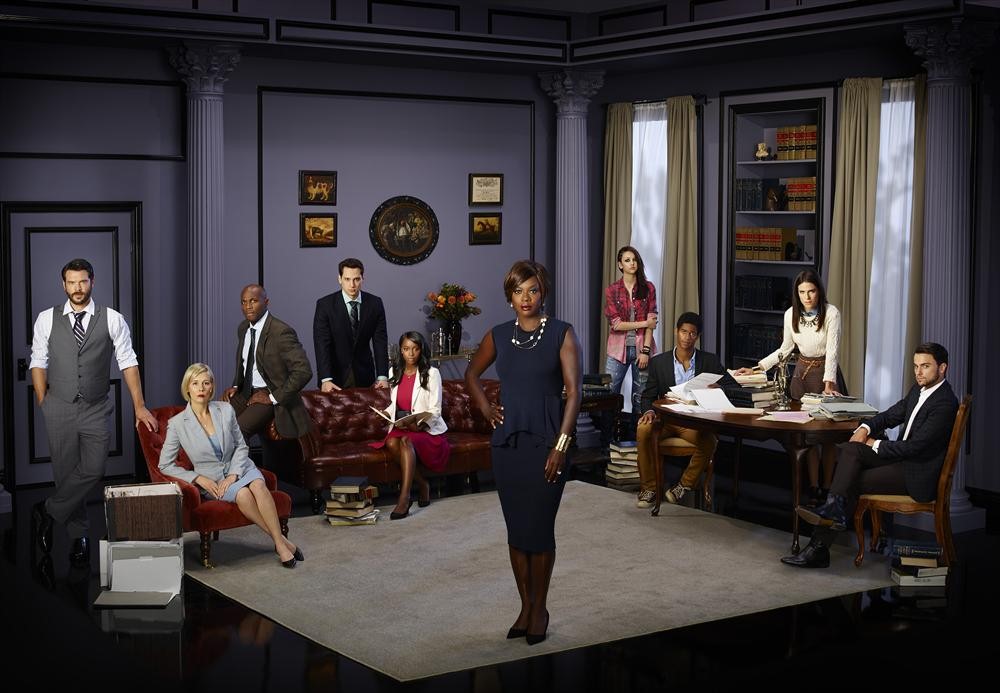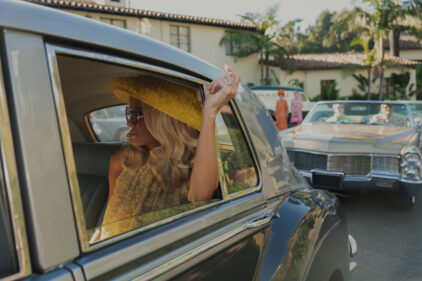One of the most depressing things about Alessandra Stanley’s
remarkably tone-deaf and insulting piece last week
on Shonda Rhimes (for which Stanley has already pulled the classic
reverse-blame apology) is that what should have been
the actual focus of the piece was buried: ABC’s “How to Get Away with Murder” is one of the few pretty good new dramas
on the major networks this Fall season. Clearly trying to replicate the success
of “Scandal,” the network has crafted another drama built on betrayals,
infidelity and a powerhouse central performance, this time courtesy of Oscar-nominee Viola Davis. It’s an imperfect show that mistakes hyperactivity for
actual storytelling but Davis sells it, and it’s so quickly paced that one
doesn’t really have time to get aggravated by its flaws. Coincidentally, ABC
also launches the best new sitcom of the Fall season the night before in “Black-ish,” a show that’s not only
very funny but serves as insightful commentary on the box placement that got
Stanley into such trouble. Maybe she should have watched it first.

Just as Stanley felt it appropriate to call Rhimes an “angry
black woman” and frame it as some sort of compliment, Andre’s (Anthony
Anderson) boss at the advertising firm at which he works thinks it’s OK to name
him “Senior Vice President, Urban Division.” As “Dre” points out Barack Obama
isn’t “President of the Urban United States.” Created by Kenya Barris, Anderson’s
family sitcom about cultural identity in the ‘10s is often insightful and surprisingly
funny given the potential pitfalls of its premise. The pilot sometimes takes a
few broad strokes to cement its concept but there’s a believable dynamic in the
core of this family that works to the degree that most sitcoms take years to
develop. Anderson has an entirely genuine husband-wife rapport with Tracee
Ellis Ross from episode one, and the kids feel like more than devices for
cultural stereotypes. There are even times when “Black-ish” reminds one of the
trailblazing sitcom about black middle-to-upper class families, “The Cosby
Show.”
Dre and his wife Rainbow have worked hard to give their kids
what they never had. He’s a high-powered, ladder-climbing exec; she’s a doctor.
But Dre is noticing that his four kids have lost touch with their roots. His daughter
can’t put down her phone, his older son wants to convert to Judaism for the Bar
Mitzvah and his two youngest don’t know that Obama was the first black
president. When Dre is forced to take the aforementioned quasi-promotion
instead of the real one he was expecting, he brings his issues to the family
dinner table.
But it doesn’t play out in the stereotypical way you might
expect. Maybe Dre is the jerk for not embracing his kid’s interest in floor
hockey over basketball. Maybe “Pops” (a perfectly cast Laurence Fishburne) is
the one more out of touch than Dre’s kids. “Black-ish” takes a premise that
could have been routine and makes it work by focusing on likable, smart, funny
central characters. Some of the workplace stuff is a bit overwritten but the
family table scenes are clever. We’ve seen SO many movies and TV shows in
recent years that try to comment on the state of the family in today’s
tech-obsessed world, and they almost always return to jokes about Instagram and
cultural clichés. “Black-ish” stands out by offering much-needed depth to the
debate. There’s more than one way to be culturally in tune. There’s more than one
way to break out of the restrictions that society places on you or you place on
yourself. And if “Black-ish” fulfills its promise by being both a relatably
hilarious family sitcom AND a commentary on race and culture in today’s world,
it could be one of the more essential shows on television for some time to
come.

Far less essential but still entertaining is the next night’s
“How to Get Away with Murder,” starring the always-fantastic Viola Davis as
Professor Annalise Keating, the kind of Criminal Law teacher who apologizes to
her students for the mistakes they must have made to get stuck in the toughest
class in school. Keating is driven to the point of abuse, insulting the
intelligence of her students on day one, trying to put pressure on her kids to
weed out the ones who couldn’t make it in a courtroom. She even has them work
an active case before opening a book, forcing them each to come up with a unique defense
for her client. The best arguments win positions at her law firm. But each one has to be different. The point is clear: it’s not about the law, but the most creative way to defend your client.
Candidates for the job include the wide-eyed but naïve Wes
Gibbins (Alfred Enoch), confident Michaela Pratt (Aja Naomi King), tricky
Connor Walsh (Jack Falahee), quiet Laurel (Karla Souza) and snobby Asher (Matt
McGorry). They work with two of Keating’s assistants: Frank (Charlie Weber) and
Bonnie (Liza Weil).
It’s a lot of names and faces to introduce an audience to in
episode one, and the clutter is enhanced by the fact that we learn that
Annalise’s best and brightest eventually get involved in something murderous of
their own. The premiere opens with the students trying to hide a body, flashing
back to their first day in Keating’s class along the way. Did Annalise really
teach her students “How to Get Away with Murder”? It’s hard to say how long
this structure will last. Will we jump forward next week or will the show take
place in two timelines all season? And then shoving an actual
mystery-of-the-week in there too? “How to Get Away with Murder” is a crowded
show, a fact that the producers try to discuss by editing like a music video.
This thing flies, with more cuts than your average sports broadcast. I’ll say
that I watched it twice (an original, less-hyper version and the revised one)
and it felt much shorter than its running time both times. However, it’s a show
that needs to slow down and catch its breath soon or viewers will be more
exhausted than entertained.
I’m also hoping it slows down long enough for Davis to
shine. She has a few beats here that feel overcooked—her classroom introductory
scene is so far over-the-top that it shatters belief—but she already shows
signs of the well-rounded character I expect she’ll develop, especially in the quieter
beats, such as after a student catches her in an intimate moment. Davis is such
a phenomenal actress that it’s tempting and easy to say that she’s better than
the material she’s given here, but hopefully she can elevate the show around to
her level. She does so often enough in the premiere that I’m willing to see if
she can keep it up.












